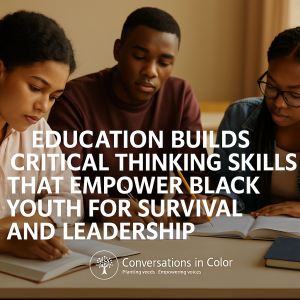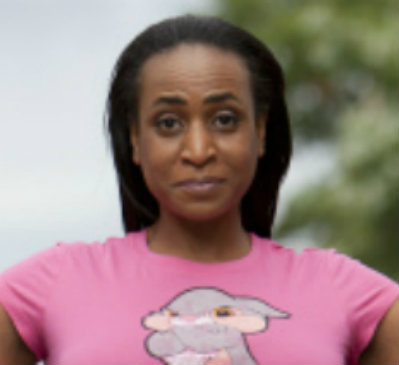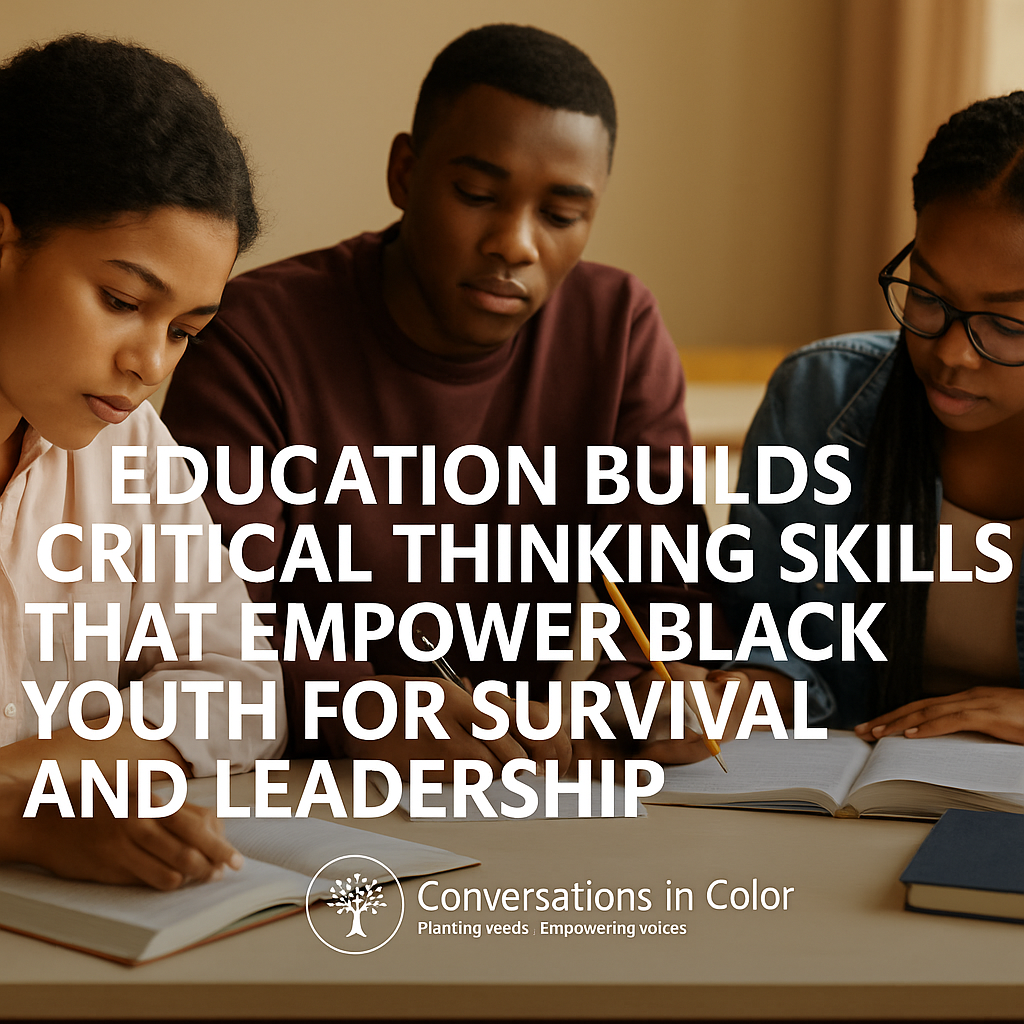Education + Critical Thinking: A Lifeline for Black Youth in America
Introduction: Why Education Still Matters
In 2025, where information moves faster than ever and social dynamics constantly shift, education for Black youth isn’t just about getting a job or receiving praise — it’s about developing the reasoning skills needed to survive, resist injustice, and lead. Across careers — whether doctor, lawyer, plumber, teacher, or entrepreneur — the ability to think critically is essential. Without it, Black youth risk being misled, underrepresented, or powerless.
At Conversations in Color, we believe education is more than academics — it is empowerment and survival.
Muhammad Ali’s Call to Action
In 1974, Muhammad Ali spoke to the youth on The Dick Cavett Show and warned: don’t chase only athletic dreams. He urged young people to focus on education — because what they learn in school is a foundation no one can take away. Even if you don’t become a famous athlete, an education gives you tools — tools for reasoning, resisting injustice, making decisions, and navigating life as a Black person in America.
Ali’s message still resonates deeply: knowledge and critical thinking open doors.
The Power of Critical Thinking: What the Research Shows
Here are some studies and statistics that validate why teaching critical thinking is not optional — it has measurable impacts on academic performance, employability, and long-term success.
| Study / Source | Key Finding | Why It Matters for Black Youth |
|---|---|---|
| Pearson / Partnership for 21st Century Learning | Up to 81% of companies surveyed say critical thinking is one of the most important employability skills. Also, research shows explicit critical thinking instruction improves academic outcomes. | Helps young people compete fairly in the job market, not just rely on stereotypes or “traditional paths.” |
| “Cultivating Critical Thinking Skills: A Pedagogical Study” | According to a NACE survey, 99.2% of employers consider critical thinking essential for new hires. | Shows that no matter your path — medical, legal, trades, or business — you will be expected to reason well. |
| ScienceDirect: Study of Critical Thinking in Executive MBA Students | Found a strong correlation between critical thinking ability and academic performance. | When stakes are high, those with reasoning skills are more likely to succeed and persist — especially Black students who often face additional stressors. |
| “Role of Critical Thinking Skills & Learning Styles” (PMC-NCBI) | Students who engage in learning styles that promote reasoning perform better academically. | Argues schools and community programs should move beyond rote learning to reasoning-based approaches. |
| “Critical Thinking: Creating Job-Proof Skills for the Future” | As AI and automation grow, human reasoning (critical thinking + creativity) becomes more irreplaceable. | For Black youth, often exposed to job instability, critical thinking provides resilience. |
Beyond academics and employment, the development of critical thinking skills also improves how individuals in the Black community interact with one another. When reasoning and problem-solving are emphasized, conversations within families, friendships, churches, and organizations become more constructive. This helps reduce conflict, builds stronger collaboration, and ensures that differences are handled with respect and logic rather than miscommunication or mistrust.
The Dangers of Not Developing Reasoning Skills
When critical thinking is neglected, particularly in Black communities, the consequences go beyond academic underachievement. Here are some risks:
- Vulnerability to misinformation: Without skills to analyze arguments, young people may be misled by false narratives, media bias, or propaganda.
- Limited ability to advocate for oneself: Whether in healthcare, legal settings, or workplaces, it takes reasoning skill to understand your rights, ask the right questions, or challenge unfair treatment.
- Economic disadvantage: Jobs that require problem-solving, negotiation, and adaptability tend to pay better. Without these skills, Black youth may be steered into lower-paying, less stable work.
- Psychological toll: Feeling unable to keep up, being misrepresented, or seeing opportunities pass by can contribute to frustration, mistrust, or disengagement.
Why Critical Thinking Matters Across Every Profession
Whether you become a doctor diagnosing patients, a lawyer arguing for justice, or a plumber fixing pipes: thinking well matters.
- Doctor: must distinguish symptoms, evaluate treatments, question diagnoses.
- Lawyer: must argue with logic, challenge assumptions, weigh evidence.
- Tradesperson or plumber: must diagnose issues, plan solutions, interact with clients, adapt to unexpected circumstances.
In every case, you won’t always have perfect information. Critical thinking helps you fill gaps wisely and make sound decisions.
What Must Change: A Blueprint for Black Communities
To make this shift, here are five concrete steps:
- Education system reforms
- Load school curricula with reasoning-based work (debates, discussion, ethical dilemmas).
- Train teachers explicitly to teach argumentation, evaluation of evidence, and logic.
- Load school curricula with reasoning-based work (debates, discussion, ethical dilemmas).
- Community & Family Support
- Encourage parents/caregivers to value reasoning over mere obedience. Ask children “why?” and “how do you know?” regularly.
- Use community spaces (churches, youth groups) to host workshops or dialogues on reasoning, history, and civic awareness.
- Encourage parents/caregivers to value reasoning over mere obedience. Ask children “why?” and “how do you know?” regularly.
- Role Models & Mentorship
- Elevate Black individuals in all fields who demonstrate reasoning and leadership, not only athletic success.
- Mentorship programs where young people can see how reasoning helped someone overcome barriers.
- Elevate Black individuals in all fields who demonstrate reasoning and leadership, not only athletic success.
- Policy & Funding
- Advocate for policy that funds critical thinking programs, especially in under-resourced schools.
- Support grants or nonprofits that integrate reasoning, civic literacy, and media literacy into youth education.
- Advocate for policy that funds critical thinking programs, especially in under-resourced schools.
- Return to Community-Led Education Models
- Even if the Black community has to return to the “Freedom School” model once used to educate our young people outside mainstream classrooms, it’s up to us as a collective to ensure our children acquire the education they need. Historically, Saturday Schools and freedom schools filled gaps left by unequal systems, teaching not just reading and math but also history, culture, and critical consciousness. Reviving or reinventing this model reminds us that we cannot wait for the system alone to do the work — we must take responsibility as a people to pass on knowledge, sharpen critical thinking, and prepare our youth for survival and success.
- Even if the Black community has to return to the “Freedom School” model once used to educate our young people outside mainstream classrooms, it’s up to us as a collective to ensure our children acquire the education they need. Historically, Saturday Schools and freedom schools filled gaps left by unequal systems, teaching not just reading and math but also history, culture, and critical consciousness. Reviving or reinventing this model reminds us that we cannot wait for the system alone to do the work — we must take responsibility as a people to pass on knowledge, sharpen critical thinking, and prepare our youth for survival and success.

Conclusion: Education + Reasoning = Survival, Power, and Freedom
Muhammad Ali said it plainly: don’t depend on athletic dreams alone. Go to school. Get an education. Because what you build with your mind — your ability to reason, question, analyze, and think critically — is something no system, no hardship can take from you.
For Black youth, education combined with critical thinking is more than a path to success. It’s essential for resistance, survival, and leadership. Let’s make sure we don’t leave these skills to chance. They deserve them. We owe it to them.

| Lana Reid |
